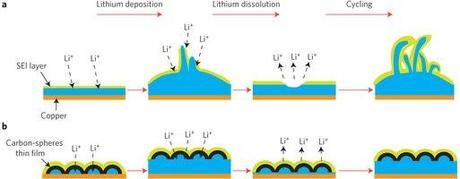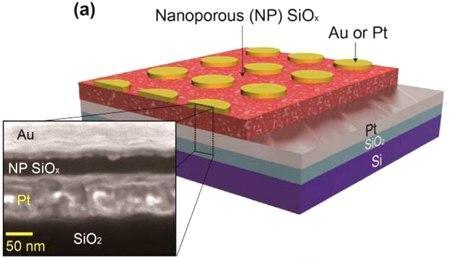From recording HD videos to playing games, today’s smartphones can do a lot of things, and depending on the tasks you may want to perform, the price of these devices gets higher as well. But one thing all these devices have in common is their very limited battery life. No matter if you have the latest iPhone or the Galaxy phone, you will end up recharging your phone battery once or maybe twice a day.

A thin film of SEI layer forms quickly on the surface of deposited Li (blue). Volumetric changes during the Li deposition process can easily break the SEI layer, especially at high current rates.
Thanks to a group of researchers at Stanford, you won’t be having that problem with future devices. These researchers have developed a new lithium ion battery technology with a monolayer nanoscopic carbon coating for lithium metal anode to “isolate the lithium metal depositions and facilitates the formation of a stable solid electrolyte interphase”, allowing the battery power last for more than two or even three times the battery life of today’s smartphones. This technology will also help improve the future of many other areas, even including electric vehicles.

This scanning electron microscope image and schematic show the design and composition of new RRAM memory devices based on porous silicon oxide that were created at Rice University. Credit: Tour Group/Rice University
The other great news comes from the researchers at Rice University, where they have found a new technology that could be used to squeeze in 1-Terabyte of storage into a smartphone. According to Rice University, they have developed a new type of Resistive RAM (RRAM) using porous silicon oxide, and reducing forming voltage, which would allow it to perform at room temperature and with a low voltage. Basically, this will let manufacturers pack “one terabyte of data on a device the size of a postage stamp”
Read Also: Google’s new Driverless Car Comes Without a Steering Wheel
In just a couple of years, your phone with 64GB storage will look like a child’s toy compared to devices that house 1TB of internal storage. And you will finally be able to say goodbye to those huge battery packs as well.
[Photo Credit: Wiki Commons ]
(All images, trademarks shown on this post are the property of their respective owners)
Follow @nrjperera – Roshan Jerad Perera

